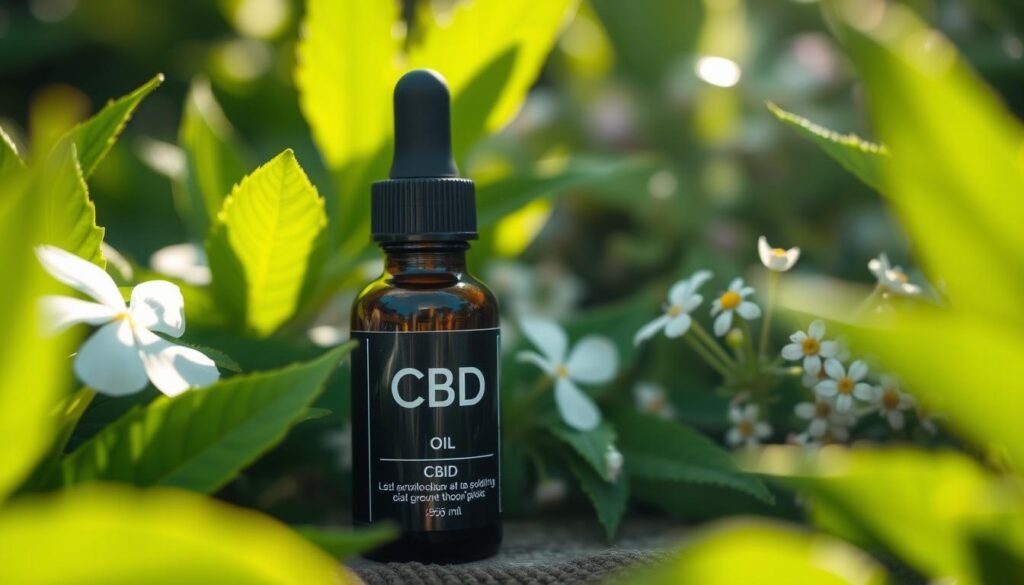It’s quite shocking to learn that over 19% of U.S. adults struggle with anxiety each year. This condition is not just common worry. It can grow into a major obstacle that affects everyday activities. Anxiety disorders are different because they strike more often and with greater force, making normal life challenging. Looking into natural remedies for anxiety offers a glimmer of hope.
There are many natural ways to reduce anxiety, from getting active and practicing mindfulness to trying out herbs and changing your lifestyle. These non-pharmaceutical anxiety treatments can work alone or alongside other treatments. Taking a chance on alternative remedies for anxiety might just be the key to handling symptoms better and feeling happier.
Key Takeaways
- Anxiety disorders affect over 19% of U.S. adults annually.
- Natural remedies can complement traditional anxiety treatments.
- Exercise may alleviate anxiety symptoms significantly.
- Herbs like chamomile and lavender show promise for anxiety relief.
- Alternative remedies can improve overall well-being.
Understanding Anxiety Disorders
Anxiety disorders include many conditions that greatly affect a person’s life. These range from generalized anxiety disorder to specific phobias. People often feel nervous, restless, or tense. These feelings can make everyday tasks hard. Almost 20% of adults in the U.S. face these disorders each year, showing how common they are.
There are different kinds of anxiety disorders. About 7 million adults deal with generalized anxiety disorder. Meanwhile, around 6 million people have panic disorder. Social anxiety disorder affects 15 million adults, hitting men and women equally. This chronic anxiety can harm both work and personal life.
Getting the right diagnosis and treatment is key. Experts often suggest cognitive behavioral therapy to fight the symptoms. Sometimes, medication is also needed, especially for constant anxiety. Starting treatment early is important. Many mental health issues start by age 14. Yet, many kids keep feeling anxious as they grow up. With the right help, managing anxiety becomes much easier.
Overview of Natural Remedies for Anxiety
Natural remedies are alternatives to standard anxiety treatments. They include holistic practices such as herbal treatments and aromatherapy. These methods aim to boost relaxation and mental wellness. Many people find them appealing because they often have fewer side effects than pharmaceuticals.
Definition of Natural Remedies
Natural remedies for anxiety cover a range of interventions. This includes holistic approaches for anxiety relief and natural supplements for anxiety relief. Examples are Chamomile, Ashwagandha, and Melatonin. Techniques like acupuncture and mindfulness help by fostering calmness and lowering stress.
Benefits of Using Natural Remedies
Using natural remedies has several benefits. They can improve life quality, helping people handle their anxiety more easily. Key advantages include fewer side effects than drugs. They also allow for personalized treatment plans.
They incorporate stress-relief methods like yoga and meditation. This promotes mental health. Plus, there’s access to herbal supplements for a calming effect.
Talking with healthcare providers is important when considering these options. This ensures natural remedies fit well into overall treatment plans. More information can be found here.
| Natural Remedy | Benefits | Key Ingredients |
|---|---|---|
| Aromatherapy | Promotes relaxation and sleep | Lavender, Bergamot |
| Yoga | Enhances mindfulness and reduces symptoms | Physical postures, Breath control |
| Herbal Supplements | Reduces anxiety symptoms | Ashwagandha, Melatonin, Chamomile |
Exercise as a Natural Remedy
Working out regularly is a great way to handle anxiety. Different exercises can make you feel mentally better and reduce anxious feelings. Making exercise a habit not only makes your body healthier. It also strengthens your emotional health.
Types of Exercise Beneficial for Anxiety
Several workouts are great for lowering anxiety. These include:
- Aerobic workouts: Actions like jogging, cycling, or swimming boost your heart rate. They also produce endorphins, making you happier.
- Yoga: Yoga helps with relaxation and staying present, reducing anxiety.
- Mindfulness-based exercises: Combining meditation with movement brings peace.
Doctors recommend 150 minutes of moderate aerobic activity every week for good health. Even short, quick exercises during the day help. Doing structured exercises, like lifting weights, can also boost your self-esteem. It helps fight anxiety well.
Scientific Studies Supporting Exercise for Anxiety Relief
Many studies show that exercise is great for easing anxiety. They connect being active with better mental health. One study showed that exercise changes how brain chemicals linked to anxiety work. For more details, check out this article on exercise and anxiety.
Regular exercise naturally helps with anxiety. It builds confidence as you reach your fitness goals. This helps in dealing with anxious feelings. Any increase in physical activity is good for your emotional state.
Herbal Remedies for Anxiety
Anxiety impacts a lot of people across the U.S. They look to herbal remedies for anxiety instead of usual treatments. Many herbs have been helpful in easing anxiety, introducing a natural way to find relief.
Popular Herbal Options
Here are some well-liked herbs:
- Chamomile: Chamomile tea is known for its soothing properties. It’s recommended for easing anxiety symptoms.
- Ashwagandha: This adaptogen has been beneficial in research. Taking 600 mg daily has shown to lower stress and anxiety.
- Kava Kava: Kava helps calm the mind, useful for lessening anxiety. It’s important to use it carefully due to possible drug interactions.
- Passionflower: Early research suggests it can be as effective as some anxiety drugs, but without the bad side effects.
Effectiveness and Safety Considerations
Natural supplements for anxiety relief have their advantages. About 45% of studies on these supplements report good outcomes for anxiety and depression. They usually come with less side effects than standard drugs. But, it’s key to talk with a healthcare pro before trying any new herb, especially if you have health issues or take other meds.
While some herbs help, they might have side effects or not mix well with other meds. Getting advice from a healthcare expert is important. This ensures the safe and beneficial use of herbs. It helps people make smart choices in managing their mental health.

To learn more about specific herbs and how they help with anxiety, you can read more about these natural solutions.
Aromatherapy for Stress Relief
Aromatherapy is a natural way to help relax and fight stress using essential oils. It creates a peaceful atmosphere, making it easier to deal with anxiety. Essential oils like lavender, citrus, and bergamot are popular. They are known for their calming effects and have been proven to help reduce anxiety.
Essential Oils for Reducing Anxiety
Lavender oil is well-studied and helps improve sleep and reduce stress, especially in hospitals. Citrus oils, like bergamot and lemon, are also great. They help lower anxiety in stressful situations, such as before surgeries. Chamomile, clary sage, and ylang-ylang oils also help bring calm and relaxation, aiding in stress management.
Methods of Use for Aromatherapy
There are many ways to use aromatherapy in your daily life. Using diffusers can spread the scent of essential oils through the air, creating a calming space. You can also mix oils with carrier oils for use in massages or baths. This makes the experience even more relaxing. Just breathing in the scent of essential oils can give quick relief from anxiety. Finding the best way to use aromatherapy can be helpful for those looking to reduce stress.
The Role of CBD Oil in Anxiety Management
CBD oil is gaining popularity as an option for managing anxiety without needing drugs. Known formally as Cannabidiol, CBD doesn’t make people feel high. That’s because it is non-psychoactive. This quality makes CBD attractive to those who want anxiety relief without the high from marijuana.
Understanding CBD and Its Uses
Scientists are learning how CBD could help alleviate anxiety. They’ve found CBD may affect the brain’s receptors related to anxiety and fear. A notable study in 2011 showed participants with social anxiety felt less anxious after taking a 400mg dose of CBD. This evidence suggests CBD oil could be a helpful treatment for anxiety.
Research on CBD Effectiveness
Further studies highlight CBD’s effectiveness in different situations:
- A 2018 study showed that males who took a 300mg dose of CBD before speaking publicly felt less anxious.
- Research has found CBD can reduce PTSD symptoms, like nightmares. This shows its potential alongside other treatments.
- Trials have proved CBD is safe, even in doses up to 1500mg/day, and users tolerated it well.

While these findings are encouraging, caution is advised. It’s crucial to choose high-quality CBD products. Before using CBD oil, talking to a healthcare provider, especially if you’re on other medications, is wise. Also, knowing your state’s laws about CBD is important, as they differ nationwide.
| Study Year | Dose of CBD | Findings |
|---|---|---|
| 2011 | 400mg | Reduced anxiety in individuals with social anxiety disorder |
| 2018 | 300mg | Significantly reduced anxiety before public speaking |
| Various | Up to 1500mg/day | Well tolerated across several human trials |
Meditation and Mindfulness Techniques
Meditation and mindfulness are key in reducing anxiety and improving mental health. By adding meditation into daily life, people can handle stress and tough emotions better.
Different Forms of Meditation
Many meditation forms help lower anxiety, such as:
- Mindfulness Meditation: It’s about living in the moment and understanding our thoughts and feelings without judging them.
- Transcendental Meditation: This method uses a mantra to deeply relax the mind.
- Guided Meditation: A guide or script leads you through a journey in your mind.
- Yoga and Tai Chi: These practices mix meditation with movement, promoting relaxation and awareness.
Benefits of Meditation for Anxiety Reduction
Studying meditation shows it helps manage anxiety in ways like:
- Lower Resting Heart Rate: It helps relax and lower tension in the body.
- Improved Emotional Well-being: Meditation increases self-awareness, helping deal with negative feelings.
- Enhanced Focus and Attention: Mindfulness over time leads to better concentration, easing anxiety triggers.
- Complementary Medicine: It’s an affordable stress reliever that doesn’t need special tools or places.
- Consistency is Key: Practicing every day for six months can bring about natural mindfulness and greater benefits.
Meditation is a strong tool for those dealing with anxiety. It uses mindfulness techniques to improve mental health for a more balanced, happy life.
Breathing Techniques for Anxiety Relief
Anxiety is common in many people’s lives. However, when it begins to impact feelings, thoughts, or actions, it’s time to step in. Breathing techniques are very helpful for managing these feelings. They let individuals build calmness and take control of their emotions. Anxiety relief exercises like diaphragmatic breathing and mindfulness connect people deeply with their breathing. This connection promotes relaxation and mental clarity.
Types of Breathing Exercises
There are several effective breathing techniques to lower anxiety. Let’s look at some key examples:
- Diaphragmatic Breathing: This method makes the belly expand and contract. It activates the calm-response system of the nervous system and lessens stress reactions.
- Box Breathing: This involves inhaling, holding the breath, exhaling, and holding again, all for a count of four. It helps improve focus and calmness.
- 4-7-8 Breathing: Working as a natural calmative, this approach includes inhaling for four seconds, holding for seven, and exhaling for eight.
- Lion’s Breath: By taking deep breaths and making a roaring sound, this relaxes the face, reduces stress, and boosts heart health.
- Mindfulness Breathing: This means being fully present and using all five senses to be aware of the breath. It is great for easing anxiety.
Impact of Breathing on Anxiety Levels
Regularly practicing deep breathing for stress lowers anxiety significantly. Studies show that 54 out of 72 methods tested worked well in reducing stress and anxiety. Doing breathing techniques for 20 to 30 minutes each day can make you more relaxed and think clearer. Techniques like resonance breathing bring the body into a calming rhythm.
Experts also suggest using different breathing methods like pursed-lip and resonant breathing through the day for added benefits. Adding anxiety relief exercises to daily life helps people learn to switch to deep breathing on their own. This skill is key to managing stress better. For more tips on specific breathing exercises, here’s a helpful link.

Lifestyle Changes to Reduce Anxiety
Making changes in our daily lives can help lessen anxiety. Focusing on what we eat and avoiding harmful substances is key. This helps in better managing anxiety symptoms.
Dietary Considerations
Eating a diet full of fruits, veggies, grains, and lean meats is beneficial. These foods provide important nutrients that help our mental health. Magnesium and omega-3 fatty acids are especially good for reducing anxiety.
Foods rich in magnesium and omega-3s, like salmon and walnuts, are effective. They help in lowering anxiety levels.
Reducing Alcohol and Caffeine Intake
Cutting back on alcohol and caffeine is crucial for anxiety management. These stimulants can make anxiety worse. By limiting these, you can achieve a more balanced mental state.
Switching to herbal teas or decaf drinks can be helpful. It promotes relaxation and supports a calmer way of living.
Conclusion
Many people face anxiety, but natural remedies can help. About 40 million Americans deal with this mental issue. It’s key to explore all kinds of treatments.
A look at 24 studies with 2,619 people shows we need a mix of strategies. Exercise, herbs, and mindfulness are all part of a good plan. This approach helps manage anxiety well.
Practices like mindfulness can really lower anxiety. Research from 163 studies supports this. Also, herbs like kava and lavender oil work well with few side effects. They are good for those wanting natural options.
It’s important to keep vitamins like B6 and magnesium in check. Not having enough can make anxiety worse. So, a balanced diet matters too.
However, talking to doctors before trying these treatments is crucial. They can guide you to what’s best for your situation. This ensures a safe path to feeling better.
To learn more about natural anxiety solutions, check this detailed study on herbs and dietary aids. It’s full of helpful info.